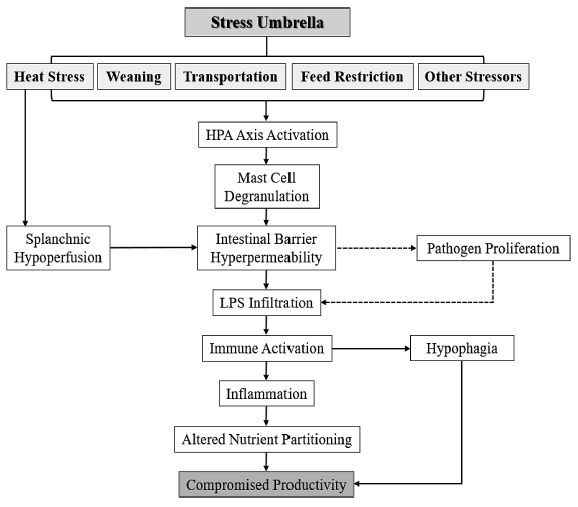
Research Note
Under the Stress Umbrella:
Gut Integrity for Well-Modulated Immune Response
A growing body of research suggests that virtually all types of stress in dairy cows affects the hindgut, ramping up an immune response. Moreover, modern cows, bred for high production, may be more susceptible to common stressors, which form a “stress umbrella” that degrades gut integrity and reduces productivity.
 The transition period is naturally stressful, notes Iowa State’s Dr. Lance Baumgard: “So some level of immune activation and the inevitable inflammatory response are normal during transition and appear to indicate a functionally robust immune system.”
The transition period is naturally stressful, notes Iowa State’s Dr. Lance Baumgard: “So some level of immune activation and the inevitable inflammatory response are normal during transition and appear to indicate a functionally robust immune system.”
High fiber diets?
Recent work with transition cows in his lab has focused on whether hindgut acidosis would compromise the intestinal barrier and cause or contribute to excessive inflammation, which has been a concern feeding high-fiber diets. However, for cows acclimated to a high-fiber diet, studies showed there was no inflammatory effect or brake on milk production.
“Nonetheless,” Baumgard emphasizes, “during lactation there is no scenario where lower milk yield is not an indicator of stress.”
Heat stress
 Heat stress stands out. Researchers suggest genetic selection for increasing milk yield can lower the minimum temperature-humidity index (THI) at which heat stress begins to depress milk yield. Lower feed intake and milk yields occur at higher THI. However, Baumgard points out that heat stress affects many endocrine, physiological, metabolic, circulatory, and immunological variables — independent of feed intake.
Heat stress stands out. Researchers suggest genetic selection for increasing milk yield can lower the minimum temperature-humidity index (THI) at which heat stress begins to depress milk yield. Lower feed intake and milk yields occur at higher THI. However, Baumgard points out that heat stress affects many endocrine, physiological, metabolic, circulatory, and immunological variables — independent of feed intake.
The stress umbrella points to how cows cool themselves by moving more blood to the skin, away from the gastrointestinal tract (splanchnic hypoperfusion). This response degrades intestinal epithelial tissue and promotes “leaky gut” (intestinal barrier hyperpermeability). At the same time, heat stress activates the hypothalamic-pituitary-adrenal (HPA) axis, which also interferes with normal intestinal barrier function.
Leaky gut allows intestinal pathogens to infiltrate and their antigens stimulate an immune response causing inflammation at the site and potentially beyond. As the immune response ramps up, it requires more energy — studies suggest the requirement may be 2 kg per day or more of glucose plus amino acids produced by “whole-body” metabolic adjustments. Nutrient repartitioning to support the immune response helps account for the negative effects of heat stress on growth, lactation, and reproduction.
Baumgard says that research is ongoing for dietary means to support hindgut tissue integrity, thereby reducing leaky gut and enabling cows under all types of stress to better modulate their immune response. Even so, focusing on gut integrity does not preclude formula adjustments to help mitigate heat stress, potentially including additional fiber to reduce the risk ruminal acidosis, more fat in higher fiber diets, and supplementation with niacin, rumen-protected methionine, and immunomodulatory additives.
Questions?
Email FeedInsight 4U

